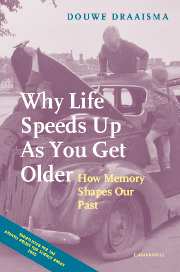Book contents
- Frontmatter
- Contents
- List of illustrations
- Acknowledgments
- 1 ‘Memory is like a dog that lies down where it pleases’
- 2 Flashes in the dark: first memories
- 3 Smell and memory
- 4 Yesterday's record
- 5 The inner flashbulb
- 6 ‘Why do we remember forwards and not backwards?’
- 7 The absolute memories of Funes and Sherashevsky
- 8 The advantages of a defect: the savant syndrome
- 9 The memory of a grandmaster: a conversation with Ton Sijbrands
- 10 Trauma and memory: the Demjanjuk case
- 11 Richard and Anna Wagner: forty-five years of married life
- 12 ‘In oval mirrors we drive around’: on experiencing a sense of déjà vu
- 13 Reminiscences
- 14 Why life speeds up as you get older
- 15 Forgetting
- 16 ‘I saw my life flash before me’
- 17 From memory – Portrait with Still Life
- Index of names
1 - ‘Memory is like a dog that lies down where it pleases’
Published online by Cambridge University Press: 22 September 2009
- Frontmatter
- Contents
- List of illustrations
- Acknowledgments
- 1 ‘Memory is like a dog that lies down where it pleases’
- 2 Flashes in the dark: first memories
- 3 Smell and memory
- 4 Yesterday's record
- 5 The inner flashbulb
- 6 ‘Why do we remember forwards and not backwards?’
- 7 The absolute memories of Funes and Sherashevsky
- 8 The advantages of a defect: the savant syndrome
- 9 The memory of a grandmaster: a conversation with Ton Sijbrands
- 10 Trauma and memory: the Demjanjuk case
- 11 Richard and Anna Wagner: forty-five years of married life
- 12 ‘In oval mirrors we drive around’: on experiencing a sense of déjà vu
- 13 Reminiscences
- 14 Why life speeds up as you get older
- 15 Forgetting
- 16 ‘I saw my life flash before me’
- 17 From memory – Portrait with Still Life
- Index of names
Summary
Our memory has a will of its own. We tell ourselves, ‘This is something I must remember, this is a moment I must hang on to, this look, this feeling, this caress’, yet within a few months, or even after just a couple of days, we find that the memory can no longer be summoned up with the colour, smell or savour we were hoping for. ‘Memory’, says Cees Nooteboom in Rituals, ‘is like a dog that lies down where it pleases.’
Nor does our memory take much notice of our order not to preserve something: if only I had never seen that, experienced it, heard of it; if only I could just forget all about it. But it's no good, it keeps turning up at night, spontaneously and uninvited, when we cannot fall asleep. Then, too, memory is a dog; it retrieves what we have just thrown away, wagging its tail.
Since the 1980s psychologists have been referring to the part of our memory in which we store our personal experiences as our ‘autobiographical memory’. It is the chronicle of our lives, a long record we consult whenever someone asks us what our earliest memory is, what the house we lived in as a child looked like, or what was the last book we read. Autobiographical memory recalls and forgets at the same time.
- Type
- Chapter
- Information
- Why Life Speeds Up As You Get OlderHow Memory Shapes our Past, pp. 1 - 14Publisher: Cambridge University PressPrint publication year: 2004



